BEAR ESSENTIALS FOR FAMILIES

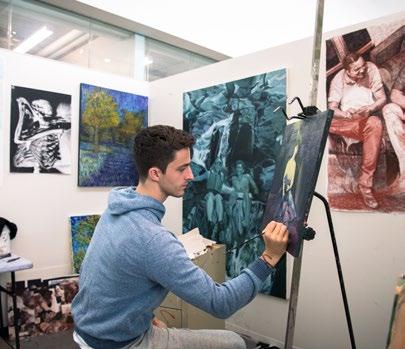
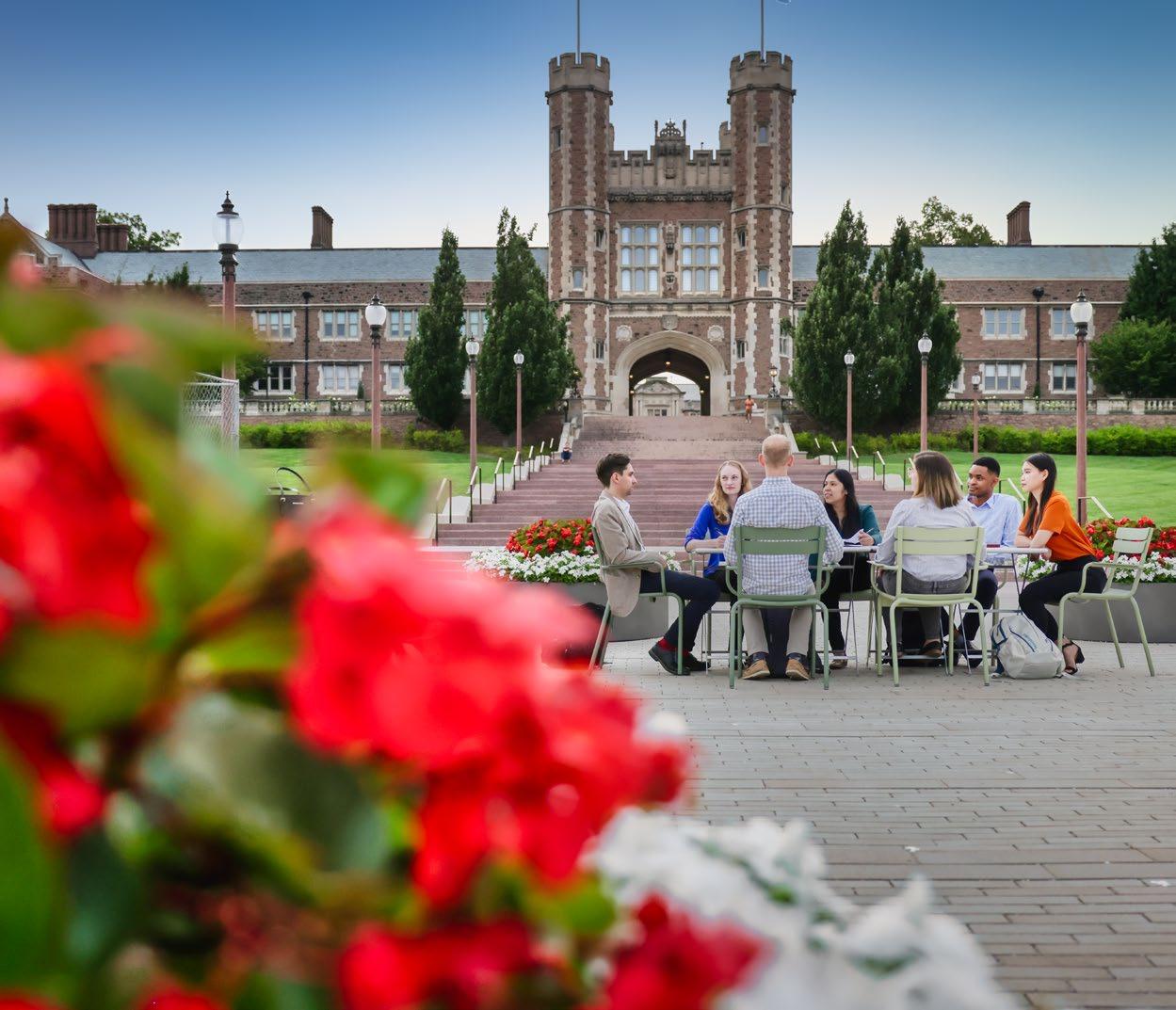
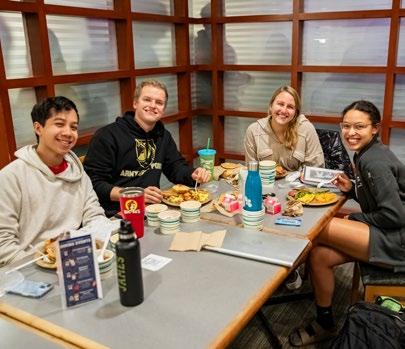

Dear parents & families,
My name is Dr. Anna Gonzalez, vice chancellor for student affairs at Washington University in St. Louis (WashU).
At WashU, we strive to provide a best-in-class student experience and we have long believed that every student should be known by name and by story. This is what makes WashU’s emphasis on the student experience — and the quality of our student’s journeys — so important. Much of the learning your student will partake in during their time on campus unfolds outside of the classroom and within programming, events, and opportunities provided by the Division of Student Affairs.
We are deeply committed to these anchors for your student’s development:
1. Career Readiness
2. Equity, Diversity & Inclusion (EDI)
3. Healthy Excellence
4. Leadership Development
5. Sense of Belonging
Furthermore, the following are examples of focus areas within our anchors:
• Our commitment to Healthy Excellence means that we are dedicated to helping students graduate with better well-being than when they arrive.
• The Center for Career Engagement enables students to chart a course for career discovery and create pathways to meaningful and competitive employment opportunities throughout life. Our four-year curriculum guides students through career exploration, provides coaching and access to practical workshops, and prepares students to compete for rewarding post-graduation opportunities.
• Dialogue Across Difference (DxD) fosters an understanding of diverse perspectives, interpersonal skills, and cultural competency to succeed in a multicultural world, starting with an introductory module for incoming first-year students. Your student will be introduced to this important competency during Fall Welcome in August.
One of the most important aspects of your student’s experience is making sure they feel a sense of belonging. We have a team of student affairs professionals ready to support your student from Move-In to Commencement and every step in between!
To remain informed throughout the year, please make sure Student Transitions & Family Programs has your contact information.
At this time, it is important to ensure WashU has your updated contact information. Your student can check their WebSTAC contact information to confirm the mailing address and email we have on file for you. Via email, we distribute Family Ties, WashU’s parent e-newsletter. We also occasionally send university-wide communications. We encourage you to download the WashU Mobile and WashU Safe smartphone apps and enable push notifications. All emergency communications from the university are disseminated through this tool.
Enclosed, you will find a summary of resources and services we offer to support your student. Additionally, there is a brief overview of important tasks for your student to complete this summer. Please visit and bookmark families.wustl.edu, a website designed with you in mind.
Welcome to WashU!
 Anna “Dr. G” Gonzalez Vice Chancellor for Student Affairs
Anna “Dr. G” Gonzalez Vice Chancellor for Student Affairs

@akgonzal327, @washustudentaffairs
TABLE OF CONTENTS THE TRANSITION TO WASHU 4 YOUR STUDENT’S LIFE AT WASHU 12 FINANCES 23 A FAMILY’S GUIDE TO THE FIRST SEMESTER 24 BEYOND THE TRANSITION 27 ACADEMICS 8 CAMPUS RESOURCES 17
THE SUMMER BEFORE WASHU
Your student’s last summer at home before college is a special one for your family. We hope you will have the opportunity to reflect and create memories. It can also be a busy time as your family prepares for your student’s arrival at WashU. Your student needs to accomplish many tasks before they move to campus. We’ve identified a series of tasks with suggested completion windows throughout the summer. Please remind your student to complete the new student summer checklist items before they arrive on campus in August.
The summer months are also a good time to make sure your student is prepared to live more independently. If your student is not already doing so, please have them begin doing their own laundry, cleaning their own living space, and cooking some simple meals.
It’s also a good time to talk about things like managing their money, learning to advocate for themselves, and setting expectations on how, how often, and when they will be in contact with you (e.g., phone calls, texts, video calls).
UTHE TRANSITION TO W ASH
Your student’s college record, including academic and health information, is their own and is not shared by the university with parents and family members. Plan to talk to your student about the information you expect them to share with you, such as grades and academic progress. Lastly, please speak to them about your family’s values and expectations around alcohol use, relationships, and healthy decision-making. The Habif Health and Well-Being Guide provides tips on how to start these conversations.
BEFORE YOU
ARRIVE CHECKLISTS
The checklists can be found at newstudents.wustl.edu under the Before You Arrive tab.
TRANSFER STUDENTS
Families of transfer students, please reference the transfer specific checklist in the New Bearings guide your student received.
MOVE-IN DAY AND FALL WELCOME
Move-in days for first-year students will be on Friday, August 16 and Saturday, August 17. Students will select their move-in date and time after they receive their housing assignment in July.
Bear Beginnings: Fall Welcome will take place Saturday, August 17 through Sunday, August 24. The weeklong event is the official welcome to the university for new students and their families. During Fall Welcome, students will engage with faculty, staff, and fellow students and learn about the experiences they will have within their academic division. They will also participate in social activities, programs, and events to encourage new friendships and prepare them for the first week of classes.
Parent & Family Orientation will include an opportunity to hear from Chancellor Andrew D. Martin and Vice Chancellor for Student Affairs Anna Gonzalez, as well as the dean of your student’s academic division. Sessions will be live streamed and recorded for families who are unable to join us on campus. A detailed schedule is available at families.wustl.edu.
As you begin making plans for your student’s move to WashU, we encourage you to visit newstudents.wustl.edu and families.wustl.edu for the most up-to-date information about what to expect and how to prepare. Your student will also receive the Residential Life Move-In Guide with detailed instructions and information about the logistics of move-in.
BEAR ESSENTIALS | 5
SHIPPING ITEMS TO CAMPUS
MAIL SERVICES
USPS, UPS, FedEx, and other parcel services deliver to your student’s WashU campus address. Packages are accepted starting 14 days prior to your student’s move-in date. Your student can find their mailing address through their WashU Housing Portal after their housing assignment is released. Ensure that you address packages using the student’s MSC number rather than room assignment. Use the template below for addressing mail to your student at WashU:
South 40 Address:
First and Last Name
MSC Number XXXXX 6515 Wydown Boulevard
St. Louis MO 63105-2298
Important reminders for shipping to campus:
• DO NOT use your students’ residential building as a delivery address.
• Use special instructions for same-day deliveries from services like Walmart, Whole Foods, Doordash, and Grubhub.
• For same-day deliveries, retrieve your order from the specified location.
• Mail Services does not assume responsibility for unattended items, including perishables. Any same-day delivery orders left unattended will be discarded for safety.
• Specify your deliveries to arrive during the business hours of 9 a.m. to 5 p.m.
UTRUCKING
UTrucking has been serving WashU students since 1977 by providing a convenient and hassle-free move-in experience for hundreds of incoming students each year. As a proud partner of WashU, UTrucking offers early-access delivery for all their move-in services, meaning that students’ items will be delivered to their rooms before their move-in date and will be waiting for them when they arrive. UTrucking offers the following move-in services:
1. Appliance rentals: With UTrucking’s most popular move-in service, students can enjoy a chilled fridge in their rooms on move-in day. Choose from a range of sizes and enjoy a full-year service guarantee on all appliances. mailservices.wustl.edu
BEAR ESSENTIALS | 6
2. Ship to school: UTrucking offers a complete solution for shipping students’ belongings to WashU from anywhere in the country. They send boxes, packing materials, and prepaid UPS labels right to the students’ doors. Simply drop off the boxes at any UPS store or arrange for a pickup, and they’ll handle the rest. The student’s items will be waiting for them in their rooms when they arrive on campus.
3. Tri-state area home pickups: If students live in one of the designated home pick-up areas in Connecticut, New Jersey, or New York, they can simplify their move to WashU with UTrucking’s doorstep pickup service. UTrucking will collect their belongings from the student’s home, transport them to St. Louis, and deliver them straight to their room.
utrucking.com
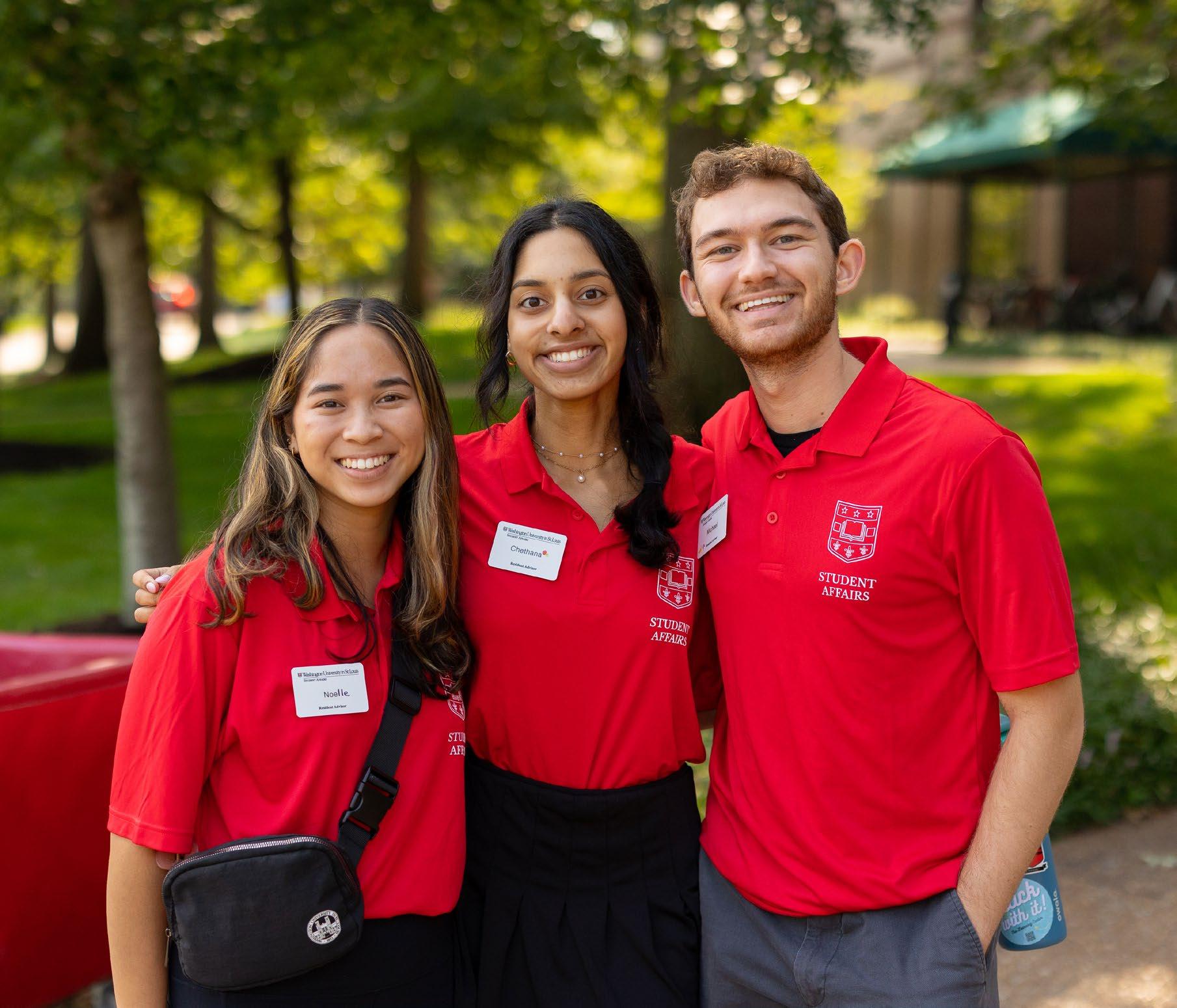
ACADEMICS
ACADEMIC DIVISIONS
Your new student’s academic experience is greatly shaped by their academic division. We encourage your student to connect with their academic division for specific questions and concerns regarding their academic experience.
COLLEGE OF ARTS AND SCIENCES
In the College of Arts & Sciences, students are part of an expansive and inclusive academic environment encompassing the natural sciences, social sciences, and humanities with more than 70 majors and minors. Students will take on unconventional perspectives, discover solutions, find community beyond disciplinary boundaries, and are equipped with skills for flexible career paths.
artsci.wustl.edu
MCKELVEY SCHOOL OF ENGINEERING
McKelvey Engineering students earn a universal degree that prepares them to solve the challenges of a rapidly changing world. McKelvey offers classroom instruction, hands-on labs, and faculty-led research, as well as study abroad and student group experiences in 11 major programs and 21 second majors and minors.
engineering.wustl.edu
OLIN BUSINESS SCHOOL
At Olin Business School, students learn to look beyond the bottom line and make thoughtful decisions that benefit business and society. Olin has a welcoming community that allows for a deeper level of engagement, collaboration, and program customization. Students can choose between nine majors and six minors with additional flexibility for interdisciplinary study with other divisions.
olin.wustl.edu
SAM FOX SCHOOL OF DESIGN & VISUAL ARTS
The Sam Fox School of Design & Visual Arts is a leader in architecture, art, and design education. They advance students’ knowledge through innovative research and creative practice, excellence in teaching, and a deep commitment to addressing the social and environmental challenges of our time. The Sam Fox School encompasses four academic units (the College of Architecture, the Graduate School of Architecture & Urban Design, the College of Art, and the Graduate School of Art) and the Mildred Lane Kemper Art Museum, each of which has its own unique history.
samfoxschool.wustl.edu
BEYOND BOUNDARIES
The Beyond Boundaries Program is for students interested in collaborative problem-solving. The program builds students’ abilities to tackle complex challenges, such as climate change, poverty, and ethical artificial intelligence, which can only be effectively addressed by bringing together experts from diverse academic fields. Beyond Boundaries supports students in exploring their personal interests and deepening their ability to work productively with others who bring different knowledge and perspectives to solve real-world problems of importance to them.
beyondboundaries.wustl.edu
BEARPRINTS FOR SUCCESS
Bearprints for Success is a one-credit, seven-week course designed to help new students make a successful transition to WashU, both academically and personally. This course sets students on a path to engage with academic readings, classroom activities, and data-driven strategies centered on the five core anchors of Student Affairs: Healthy Excellence; Leadership; Career Development; Equity, Diversity, and Inclusion; and Student Engagement and Belonging. The course also introduces students to key academic success resources, learning strategies, and support staff who will optimize their experiences at the university. Each section of the course is limited to 15 students to ensure small-group discussion and engagement.
SUPPORTING YOUR STUDENT FROM AFAR
We encourage you to check in periodically with your student about their experiences in and outside the classroom. Academically, it is common for a student to undergo an adjustment period as the rigor and classroom environment of college are different from high school. Students are more likely to succeed if they use available support resources, even if they didn’t use such resources in high school. Additionally, we encourage you to speak with your student about time management and creating a personal task management system, whether that is a calendar app, an online tool, or a printed planner.
BEAR ESSENTIALS | 9
ACADEMIC ADVISER
Students are assigned an academic adviser who will work to ensure they complete the academic milestones and requirements for graduation. Additionally, once students declare an area of study, they will be matched to a major adviser, typically a faculty member in their field of study. The major adviser has specific knowledge about research and career opportunities in the field and works to ensure that students fulfill degree requirements. Pre-professional advising is available for students interested in pre-health and pre-law.
AVAILABILITY OF FACULTY AND TEACHING ASSISTANTS
Faculty are required and happy to meet with students outside of class. They will list their availability to meet with students on the course syllabus. Many students take advantage of office visits, not only when they may be having difficulty in a course but also as a proactive way to connect with their professors, clarify understanding, and discuss research opportunities or potential career paths.
ACADEMIC SUPPORT
The Learning Center, housed within the Center for Teaching and Learning, offers a variety of scholastic supports in partnership with academic departments. These include structured, course-specific weekly study groups facilitated by trained peer mentors, as well as course-specific drop-in sessions and individual coaching for academic skills such as time management, note-taking, or handling test anxiety. The Learning Center’s peer coaches and staff also offer workshops on academic skills.
If your student struggles with executive function and time management or has been diagnosed with ADHD, you may want to consider the Learning Center for basic support. Some families find that their students benefit from the more in-depth support provided by an external executive function coach.
PREPARING FOR CLASSES
In June, your student will be contacted by their academic adviser to discuss areas of study that interest them and course options for the fall semester. Students register for classes using WebSTAC, WashU’s online service portal, during an assigned registration time in mid-July. Your student will receive instructions on how to navigate WebSTAC via email prior to registration.
Students can access syllabus information through Canvas, the university’s online learning management system. Many instructors provide syllabus and textbook information prior to the start of classes. Encourage your student to check both WebSTAC and Canvas to gather a complete textbook list before classes begin.
WASHU CAMPUS STORE
The WashU Campus Store is a one-stop shop for everything WashU and offers new, used, digital, and rental textbooks. The Danforth Campus Store is an authorized Apple Educational reseller with numerous technology items in stock. Laptops recommended by Student Technology Services can also be purchased at the WashU Campus Store.
wubookstore.com
Developing good time management and organizational skills is key for students who find themselves struggling academically. Keeping a calendar and a to-do list may seem simple, but they are effective tools to help students structure study time and stay focused.
BEAR NECESSITIES
Bear Necessities is a nonprofit general merchandise store located in Umrath House on the South 40. The store is affiliated with the Women’s Society of Washington University and proceeds from sales fund scholarships and student project grants. The shop offers a wide variety of exclusive WashU merchandise, school supplies, residential supplies, snacks, and personal and health care supplies. You can also order celebration cakes or cupcakes, balloon bouquets, care packages, and more from Bear Necessities. Keep an eye out for special offerings during the holidays.
bearnecessities.wustl.edu
STUDY ABROAD
Understanding other cultures, languages, and countries is important whether a student plans to be an environmental engineer, artist, architect, accountant, health care professional, or historian. WashU offers many ways to incorporate international study into its undergraduate programs, placing students in more than 50 countries each year.
Each undergraduate school has developed high-quality study abroad opportunities that enhance the strengths of its undergraduate programs. A variety of yearlong, semester, and summer programs allow students to earn credit toward major, minor, or general degree requirements while studying abroad.
sa.wustl.edu
BEAR ESSENTIALS | 11
HELPFU L H•PITLUFPLEH•PIT E LPFULTIP •
YOUR STUDENT’S LIFE AT W ASH U
LIVING AT WASHU
Washington University’s first-year residential areas include 10 residential communities in a section of campus known as the South 40, located at the southwest end of the Danforth Campus. As you become more familiar with your student’s residential community, you will find a dedicated group of people willing and able to help with their transition. Each residence hall has a residential community director (RCD) who is a full-time staff member that lives in residence and facilitates community engagement within the halls, assists in day-to-day operations, and manages the team of resident advisors (RAs). RAs are trained upper-division students who live in residence and serve as leaders and peer mentors. In addition, WashU faculty members also work closely with first-year student communities, providing significant faculty-student interaction outside the classroom. Each residential community also has its own dedicated custodial and maintenance personnel.
ALL ROOMS INCLUDE THE FOLLOWING FOR EACH RESIDENT:
• Bed and mattress (extra-long twin, 36” x 80”)
• Desk and chair
• Dresser and closet space
• Central air conditioning
• Small trash and recycling bin
• Blinds
• Carpeting
TRANSFER HOUSING
Families of transfer students, please reference your student’s New Bearings guide for off-campus housing resources if they are not living in Residential Life housing.
FLOOR PLANS AND VIRTUAL TOURS
Floor plans for each building can be found online at reslife.wustl.edu (search for “South 40 Residential Communities”). Virtual tours can be found online at reslife.wustl.edu (search for “virtual tours”).
PACKING
A suggested packing list can be found at newstudents.wustl.edu under the Before You Arrive tab.
DINING ON CAMPUS
All undergraduate students living in university housing or enrolled in 12 or more hours are required to have a meal plan. There is no meal plan waiver offered for the 2024-2025 academic year.
Our dining program operates on a points system with a declining balance as points are used. Meal points are allocated per semester and may be used at all Dining Services locations on the Danforth, North, and West Campuses, including Paws & Go and Millbrook Markets.
Effective budgeting is crucial for supporting students’ daily activities on campus, starting with the selection of a meal plan that suits their anticipated food purchases. As you and your student plan, consider their food preferences and ensure the chosen plan accommodates their needs across all residential and retail dining options. If your student needs time to assess their evolving needs, they can begin with a smaller plan and upgrade once they have settled into their routine.
Dining Services has experience meeting the nutritional needs of students observing a wide range of diets, including allergen-free, vegetarian, vegan, halal and kosher, among others.
Our team of registered dietitians is available to address nutrition questions and concerns in one-on-one consultations. Please email to schedule a consultation.
diningservices.wustl.edu/nutrition
nutrition@wustl.edu



BEYOND THE CLASSROOM
Your student’s priority at WashU will be academics, but how they choose to complement their learning outside the classroom is also very important. Many students look to their cocurricular involvement to form new peer connections and friendships, discover new interests, and develop healthy social engagement. We encourage your student to get involved in at least one cocurricular opportunity on campus, such as a student organization, undergraduate research, or a student work position.
ARTS ON CAMPUS
WashU enjoys a vibrant array of public arts offerings available to community and campus audiences alike. Opportunities range from world-class professional performances and exhibitions to concerts, plays, art shows, and writing workshops that give students a chance to hone their talents.
arts.wustl.edu
ATHLETICS AND RECREATION
The WashU Department of Athletics competes in Division III of the NCAA with 24 NCAA team championships, 262 Conference Titles, and 218 Academic All-Americans. We invite parents and family members to cheer on the WashU Bears!
WashUbears.com
Intramural (IM) and club sports are a fun, engaging way to find a sense of belonging on campus as well as practice healthy excellence. IM sports offer a recreational opportunity for students wanting to participate in a wide variety of sports or activities once a week. They will be competing against other student teams formed around the university. Club sports are a competitive opportunity for students wanting to participate in a more demanding student-run organization. This experience may also have a greater time and financial commitment than IM sports, as most clubs will have an opportunity to compete against other universities’ club teams.
rec.wustl.edu
CAMPUS LIFE
Campus Life empowers students to discover and define themselves and their communities through advising, programs, and resources. Campus Life supports leadership development, student group involvement, student engagement, and sorority and fraternity life.
campuslife.wustl.edu
CIVIC & COMMUNITY ENGAGEMENT
Active civic and community engagement are central to WashU’s student culture and vital to a WashU education. The university offers many opportunities, including St. Louis neighborhood immersions, civic learning, dialogue and leadership programs, community-engaged courses, voter engagement, civically focused student groups, grant funds for St. Louis impact efforts, and more. We encourage all students to meaningfully engage with the St. Louis community and with pressing civic issues throughout their time at WashU as they prepare to be engaged citizens throughout their lives. Just two of the many options students might consider on their journey to engaged citizenship include the following:
The Gephardt Institute for Civic and Community Engagement is a great place for students to get involved in the community and learn critical civic skills to translate passions into impact.
gephardtinstitute.wustl.edu
WashU Votes is a student organization that promotes voter engagement and education for undergraduates at WashU. By joining WashU Votes, students have the opportunity to expand civic engagement on campus while becoming more educated about issues facing our local, state, and federal communities.
WashUvotes.wustl.edu
DIVERSITY AND INCLUSION
The Center for Diversity and Inclusion (CDI) fosters welcoming spaces for all WashU students, with a focus on those from undeserved and minoritized communities, to build a sense of belonging, engage in transformative dialogue, and develop skills to navigate our intricate global community. As an integral part of the university’s mission, the CDI drives advocacy, education, identity development, and social justice efforts to empower students as leaders. The Center includes the following programs: Cross-Cultural Connections (CCxN), Dialogue Across Difference (DxD), Office for International Student Engagement (OISE), Office for Religious, Spiritual, and Ethical Life (ORSEL), and the Spectrum Office.
cdi.students.wustl.edu
ENTREPRENEURSHIP
The Skandalaris Center for Interdisciplinary Innovation and Entrepreneurship is the hub of creativity, innovation, and entrepreneurship at WashU. Their initiatives serve students, faculty, staff and alumni from all levels and all disciplines — because everyone can be entrepreneurial. They provide programming where anyone can explore their creative and entrepreneurial interests, develop an entrepreneurial mindset, and go from idea to launch.
skandalaris.wustl.edu
BEAR ESSENTIALS | 15
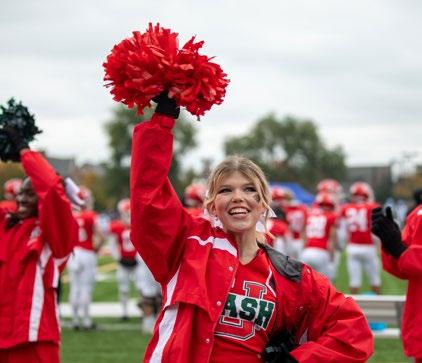

The Student Enterprise Program (StEP), an initiative of the Skandalaris Center, provides students the opportunity to own and operate their own businesses while serving the campus community with unique resources. Students can buy into an existing business or start a new one.
step.wustl.edu
STUDENT GOVERNMENT
The Student Union is WashU’s governing undergraduate student body. Its primary mission is to advocate for students, allocate funding for student groups and organize events for all students.
The Congress of the South 40 (CS40) is the representative and programming body for the residential communities. It’s a great way for students to meet people in their community and learn about leadership.
cs40.wustl.edu
STUDENT ORGANIZATIONS
WashU hosts more than 450 student organizations. At the Activities Fair, which is held at the beginning of each semester, students can learn more about student groups that align with their interests and goals.
wugo.wustl.edu
WASHU ARMY RESERVE OFFICERS’ TRAINING CORPS (ROTC)
WashU Army ROTC is an elective curriculum taken alongside required college classes. It prepares students with the tools, training, and experiences to succeed in any competitive environment. Along with offering great leadership training and a traditional undergraduate experience, participating in Army ROTC can fund students’ college tuition. Graduates become commissioned officers in the U.S. Army. Students can try Army ROTC without commitment until they contract, which is normally during the junior year.
rotc.wustl.edu
CAMPUS RESOURCES
CENTER FOR CAREER ENGAGEMENT
At WashU, we believe that career education occurs over the course of the four-year undergraduate experience, beginning during the first year. We encourage students to reflect on and understand their unique values, skills, interests, and goals.
The Center for Career Engagement provides a number of opportunities for students to engage with their professional interests. Students can expect to learn strategies for meaningful exploration of the world of work and engagement with employers and organizations. Opportunities include:
• Access to information about summer internships and research and volunteer experiences.
• Individualized career coaching and skill-building workshops.
• Signature events, including career fairs, industry speaker events, employer visits to different regions in the United States, and alumni job-shadowing opportunities.
• Opportunities to build connections with alumni, professionals, and peers in various industries through Career Communities and networks.
You can support your student’s career exploration and preparation by:
• Encouraging early and regular engagement with the Center for Career Engagement’s programs, resources, and events.
• Observing and listening to your student’s interests, values, and strengths and helping them see themes, patterns, and opportunities for continued growth and development.
• Promoting engagement in clubs, activities, passion projects, and service on and off campus as a way to grow skills, develop leadership, and try new things.
• Discussing the importance of multiple, meaningful professional experiences such as internships, research, shadowing, networking, volunteer work, and study abroad. students.wustl.edu/center-career-engagement
GENDER EQUITY AND TITLE IX COMPLIANCE OFFICE
The Gender Equity and Title IX Compliance Office is committed to responding to discrimination based on sex – including sexual harassment and sexual violence – in an effective, timely, and transparent manner.
titleix.wustl.edu
BEAR ESSENTIALS | 17
DISABILITY RESOURCES
Disability Resources (DR) provides leadership to the WashU community in creating an inclusive and accessible campus experience. Its primary objective is to ensure students can equitably access and engage within the university environment. When this cannot be done because of a student’s disability, DR is the designated office that determines reasonable accommodations in accordance with the Americans with Disabilities Act, Section 504 of the Rehabilitation Act, and the Fair Housing Act.
DR is committed to supporting disabled students with the resources necessary to enable them to accomplish their educational goals and derive the benefits of campus life. Students with concerns related to a condition or diagnosis for which support to access educational experiences may be necessary are invited to visit the DR website for information and staff contacts or to initiate a request for accommodations.
A student’s accommodations and other adjustments are coordinated on an individual, case-by-case basis relative to the student’s functional limitations and barriers. Students can initiate their request for accommodations and provide any necessary documentation through the Access WashU portal by visiting DR’s website and selecting “New Student Application.” Because DR is generally unable to determine accommodations until a student’s request and appropriate supporting documentation have been submitted, the office recommends students begin this process prior to the start of the academic term to avoid delays in appropriate resources being made available.
disability.wustl.edu
TAYLOR FAMILY CENTER FOR STUDENT SUCCESS
The Taylor Family Center for Student Success provides first-generation (first in their family to attend college) and limited-income (defined as Pell-eligible) college students with comprehensive programming, personalized mentorship, resources, and support that bridges the gap between aspiration and achievement through academic excellence, accessibility, leadership development, self-efficacy, and social impact.
The Taylor Family Center for Student Success includes the following programs: Kessler Scholars, Student Success Fund, Taylor STARS, and TRIO Student Support Services.
studentsuccess.wustl.edu
EMERGENCY PREPAREDNESS AND CAMPUS SAFETY
If a crisis occurs on campus, students and their families have multiple ways to obtain information.
• The WashU Safe App addresses and promotes student, faculty, and staff safety through important safety alerts and access to campus safety resources. Students and family members can download the app from Android or iOS.
• The Emergency Management website offers training, preparedness guides, and general safety information. In the event of an emergency, new information will be posted to the site as it is available. If there is no current emergency, the site will say so.
• Emergency Alerts are available on emergency.wustl.edu and social media. Follow @WashUReady on X (formerly Twitter). Emergency notifications are also pushed out via email. Please make sure your contact information is up to date and that you have opted to receive the alerts.
emergency.wustl.edu
ALERTS- Students and their families can get emergency alerts by downloading the WashU Safe mobile app and allowing notifications. Scan to download the WashU Safe App.
WASHINGTON UNIVERSITY POLICE DEPARTMENT
The Washington University Police Department, also known as WUPD, is a diverse law-enforcement team that provides foot, bicycle, and vehicle patrol 24 hours a day, seven days a week.
WUPD prides itself on maintaining a safe campus, and officers are here for students 365 days a year. Two comfort dogs (Brookie & Bear) also support students, faculty, and staff. WUPD has developed initiatives to enhance students’ personal safety and to protect their property. WUPD can help students register their electronics and bikes on campus to increase the chances of recovery if they are misplaced or stolen. Students may also purchase bike locks and vehicle steering wheel locks at WUPD’s office.
police.wustl.edu
BEAR ESSENTIALS | 19
HELPFU L H•PITLUFPLEH•PIT E LPFULTIP •
HEALTH AND WELLNESS
HABIF HEALTH AND WELLNESS CENTER
The Habif Health and Wellness Center provides medical services, psychiatric care, and health promotion services to students. Same-day medical appointments are available for urgent needs. Your student is required to provide Habif Health and Wellness with important documents, such as immunization records and health history. Specific requirements can be found on the Habif Health and Wellness website. In addition, your student is required by university policy to have adequate health insurance coverage. Students wishing to waive the student health insurance plan must complete a waiver annually prior to September 5. All students are welcome at Habif, regardless of insurance plan.
habif.wustl.edu
MEDICAL SERVICES
Medical Services provides routine, preventive health care; evaluation or treatment of illnesses and injuries; travel medicine; allergy shots; and immunizations. An on-site lab, radiology department, and pharmacy also serve students. After-hours care is available through TimelyCare. In addition, WUPD and the student-run Emergency Support Team of licensed EMTs respond to urgent issues on campus 24/7. Psychiatry Services provides ongoing medication management for students taking medication to address their mental health concerns. It should be noted that we will not be accepting new or transferred patients who require the prescription of stimulant medications. Stimulant medications include but are not limited to Adderall, Adderall XR, Ritalin, Concerta and Focalin. If your student is already receiving stimulant medications, we encourage you to continue working with your student’s current provider. If your student is hoping to start a stimulant, we will try to assist your student in finding an external provider that accepts your insurance.
The Habif Health and Wellness Center is committed to providing the highest quality care to students at a reasonable cost. Information about co-pays and insurance is available on the Habif website.
HEALTH PROMOTION SERVICES
Health Promotion Services provides free resources and programs, as well as risk-reduction information related to alcohol and other drug use, mental health, and sexual health. Resources on community health and self-care are also available.

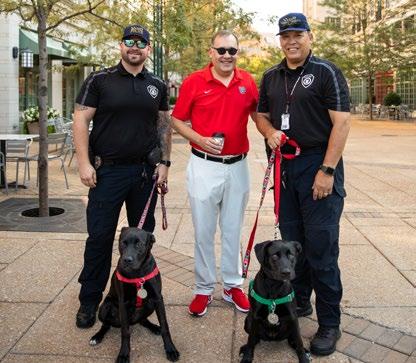
CENTER FOR COUNSELING AND PSYCHOLOGICAL SERVICES
The Center for Counseling and Psychological Services provides individual, couples, and group counseling. Students can also access tools, such as Therapy Assistance Online, which offers brief educational videos related to mental health, wellness, and substance-use issues. Thriving Campus can be used to find counseling resources when a student’s needs can be met best off campus. Crisis services are also available daily for students who need to speak with a counselor urgently. Students are encouraged to download the TimelyCare app to access 24/7 mental health support services. Learn more at students.wustl.edu/timelycare.
All full-time students who pay the university health and wellness fee as part of their tuition are eligible for services.
students.wustl.edu/counseling-psychological-services
WASHU CARES
WashU Cares provides supportive case management for students struggling with mental health and other basic needs as a preventative measure to ensure students have established support systems before beginning classes. If your student takes psychiatric medication classified as a Schedule 2 prescription, is currently in weekly therapeutic services, or has had a prior hospitalization due to a mental health-related reason, WashU Cares will assist in educating students and families about available resources on and off campus in the St. Louis area. Some of the ways we might assist students include the following:
• Co-creating a plan of action when students feel overwhelmed.
• Providing guidance about accessing basic needs (i.e., food, housing, finances).
• Collaborating on communication with university faculty and staff.
• Connecting to mental health resources on campus or in the community.
• Discussing whether a medical leave of absence to focus on their health is right for them.
students.wustl.edu/WashU-cares
STUDENT TECHNOLOGY SERVICES (STS)
STS supports Washington University residential students in addressing their technology needs. Services include hardware and software troubleshooting, support for the on-campus network (both Wi-Fi and Ethernet), printing/3D printing, and residential computer labs, among others. Student Technology Coordinators (STCs) serve within the residential communities as the first point of contact for tech-related questions.
BEAR ESSENTIALS | 21
sts.wustl.edu
LAPTOP REQUIREMENTS
WashU has general minimum requirements for laptops, which should meet the needs of most incoming students. Some WashU schools recommend a higher level of computing power than the minimum because of specific software programs required by that school. For more information, visit techden.wustl.edu/selecting-a-laptop.
TRANSPORTATION OPTIONS
Students can explore the convenience of WashU Rides, a commuter platform designed to connect fellow students for carpooling, whether they are heading to the airport or traveling during breaks. In addition, WashU provides shuttles that serve the campus and nearby areas, including shopping and dining spots. Students can track shuttles, including real-time arrivals, and receive customized notifications with the Tripshot app. If students are considering biking on campus, they can take advantage of our free bike registration and ensure their bike’s safety with a U-lock. For broader transportation options, students can sign up for the U-Pass, providing access to Metro buses and trains in the St. Louis area, with convenient stops on and around campus. U-Pass makes airport transfers hassle-free. While first-year students may not have cars on campus, CarShare offers hourly rentals for those aged 18+. For additional transportation options, visit the Parking & Transportation website.
parking.wustl.edu
STAY CONNECTED
Work with your student to ensure that your contact information (home and cell phone numbers, email addresses, and emergency contact information) is correct in their WebSTAC account. This will ensure that you, as a family member, receive all relevant information. Your student can confirm and make changes to your information via WebSTAC.
webstac.wustl.edu
YOUR STUDENT’S PRIVACY
The privacy of your student’s records is protected by federal law under the Family Educational Rights and Privacy Act (FERPA). Certain pieces of directory information (name, mailing address, and phone number) on your student’s record may be publicly available unless your student has placed an optional information restriction on their record. Your student can remove themselves from the public directory by visiting the WebSTAC portal.
FINANCES
STUDENT FINANCIAL SERVICES
Student Financial Services (SFS) takes a personal approach with your student. An assigned financial aid counselor will be with your family from the moment you exchange hellos to graduation. Before your student arrives on campus, we encourage you to check out the SFS website for information on how to view and pay the student bill, payment options, and how your student can prepare if they plan to work on campus. Your SFS counselor is available to provide information and resource assistance.
financialaid.wustl.edu
314-935-5900
PAYING THE STUDENT BILL
We encourage you and your student to have an open conversation about expectations regarding billing and finances. Once your student receives login access to WebSTAC, WashU’s online student portal, they will be able to grant access to parent(s) and family members to review bills and make payments. Once this step has been completed, an email containing a user ID, a temporary password, and a link to the online billing portal will be sent to the authorized payers or users.
BEAR ESSENTIALS | 23
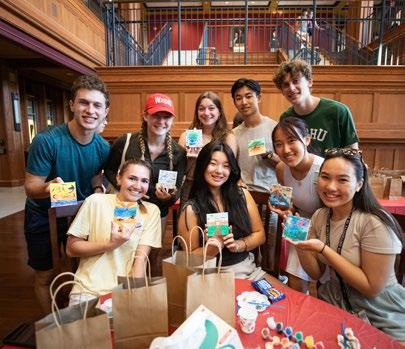
A FAMILY’S GUIDE TO THE FIRST SEMESTER
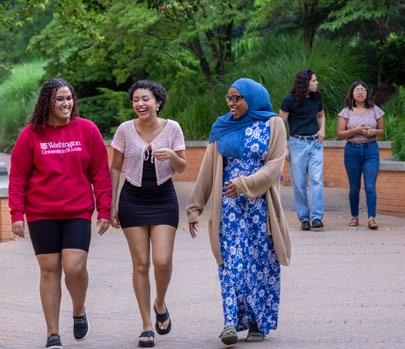

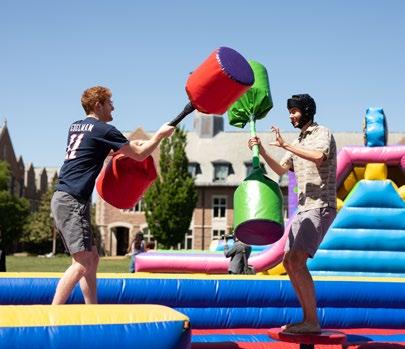
Please use this chart as a guide throughout the year to gain a general understanding of what your student may be experiencing during their first few months at WashU. You will also find some suggestions about how you can support your student throughout the first semester.
Content adapted from: Mullendore, R. H., & Hatch, C. (2000). Helping your first-year college student succeed: A guide for parents. University of South Carolina, National Resource Center for The First-Year Experience and Students in Transition.
What’s Happening
• Classes begin.
• College schedule requires some adjustments.
• New friendships form.
• New routines develop.
• Students explore cocurricular involvement and begin to find their place on campus.
• Students make initial adjustments to college courses.
• The first set of exams is scheduled.
• Students may struggle to balance academic, social, and cocurricular commitments.
• Tensions between high school and college relationships may emerge.
• Initial excitement begins to fade.
• Students may question whether they belong.
• The pace of academic work picks up.
• Callbacks and invitations to join student groups begin to go out.
• Grades for first major exams and assignments received.
First weeks on campus
What Your
Student
May Be Experiencing
• Excitement
• Nervousness
• Mild homesickness
Early September
• Testing new-found freedom.
• Anxiety about roommates, professors and classes.
• Learning to manage time between classes.
MidSeptember
• Need to develop different study habits.
• Need to develop time management strategies.
• Excitement about new relationships and sadness or anxiety about old relationships.
Late
September
Early October
• Self-doubt
• Feeling overwhelmed by academic work.
• Students will benefit from a listening ear and encouragement.
• Excitement about being selected to participate in a group or activity.
• Sadness at being rejected from a group or activity.
• Disappointment or discouragement about academic performance.
• Many students experience a decline in their academic performance early in the first semester. Help your student see this as an opportunity to make adjustments and encourage them to seek out campus resources for assistance.
What’s Happening
• Feelings of relaxation from fall break fade.
• Exams and major projects loom.
• Students begin to prepare for spring course registration.
• Students learn more about and adjust to the campus culture.
• New friendships continue to develop.
• Mid-term papers, major assignments, and exams are due.
• Students meet with academic advisers for spring course registration.
• Students may begin to explore changes to their major field.
• Grades for another round of exams or assignments received.
MidOctober
What
Your Student
May Be Experiencing
• Stress
• Anxiety
• Encourage your student to get off campus; Forest Park is a great suggestion.
• Remind your student to connect with their academic adviser about their educational plan.
Late October
• Feelings of being overwhelmed may increase.
• Your student may need reminders to take time for self-care (e.g., healthy meals, exercise, adequate rest).
Early November
• Due dates for term projects and final exams are on the horizon.
• Students register for spring classes.
• Classes wrap up for the semester.
• Plans for changing academic divisions or majors may solidify.
MidNovember/ Break
• Doubts about whether they are in the right major.
• Relief/pride in the progress they have made.
• Ongoing frustration with their academic performance.
• Excitement about seeing friends and family
• Exhaustion
• Anxiety about upcoming deadlines
• Help your students rest and recharge over the break.
• Students engaged in intense period of reading, writing, and studying.
• Reading Week schedule allows greater flexibility.
Late November/ Early December
MidDecember
• Excitement about being home for winter break.
• Feeling overwhelmed by multiple deadlines.
• Feeling anxious about upcoming exams.
• This is a good time to remind your student about positive self-care strategies.
• Sadness about leaving campus and being away from friends.
• Excitement about the opportunity to reconnect with family and friends.
• The open schedule of Reading Week makes it easy to lose track of time. Encourage your student to make a plan for how they will use the time to their advantage.
BEYOND THE TRANSITION
STAYING CONNECTED TO THE UNIVERSITY
Student Transitions & Family Programs is the primary support resource for parents and family members of all undergraduate students. We provide ongoing communications detailing campus resources, engagement with faculty and administrators, and university news and information throughout your student’s enrollment.
At times, the university sends separate communication to family members about on and off-campus events, including the Family Ties e-newsletter. To verify the family email(s) associated with your student’s record, your student should log into WebSTAC and select “Contact Information.” Your student can request changes to family email(s) by following the instructions in WebSTAC.
The Family Webinar Series connects you with staff and administrators to answer live questions about various student resources and campus events. Recordings of past webinars can be found on the Parent & Families website.
families.wustl.edu
families@wustl.edu
314-935-5040
BEAR ESSENTIALS | 27
CONTACTING YOUR STUDENT
Tear out this back cover and keep your student’s contact information and other important campus contacts in an easy-to-find location at your home or office.
MAILING ADDRESS
NAME
STREET , MSC
IMPORTANT CONTACTS
Dining Services diningservices.wustl.edu • 314-935-7098
Center for Counseling and Psychological Services students.wustl.edu/counseling-psychological-services • 314-935-6695
Habif Health and Wellness Center habif.wustl.edu • 314-935-6666
Office for International Student Engagement students.wustl.edu/office-of-international-student-engagement • 314-935-9612
Office for International Students and Scholars students.wustl.edu/international-students-scholars • 314-935-5910
Residential Life reslife.wustl.edu • 314-935-5050
Student Financial Services financialservices.wustl.edu • 314-935-5900
Student Transitions & Family Programs
families.wustl.edu • transitions.wustl.edu • newstudents.wustl.edu • 314-935-5040
University Registrar registrar.wustl.edu • 314-935-5959
This book was created by Student Transitions & Family Programs MSC 1136-332-LL One Brookings Drive, St. Louis, MO 63130-4899
314-935-5040





 Anna “Dr. G” Gonzalez Vice Chancellor for Student Affairs
Anna “Dr. G” Gonzalez Vice Chancellor for Student Affairs












